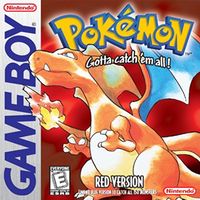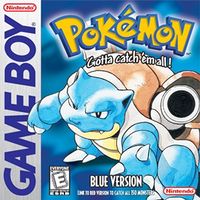| Site Notice |
|---|
|
We have a limited coverage policy. Please check our coverage page to see which articles are allowed. |
Difference between revisions of "Pokémon Red and Blue Versions"
Torchickens (talk | contribs) (→Other releases) |
Torchickens (talk | contribs) (→Other releases) |
||
| Line 59: | Line 59: | ||
|[[Virtual Console]] ([[Nintendo 3DS]]) | |[[Virtual Console]] ([[Nintendo 3DS]]) | ||
|2016 | |2016 | ||
| − | |Emulated ports for Nintendo 3DS. Communication between these games as well as ''Yellow'' including trading and battling, is possible with wireless communications. It is possible to trade with Virtual Console ''Gold'', ''Silver'' and ''Crystal'' wirelessly using those game's Time Capsule feature. Division of player money after black out is now calculated in a different way, but changes to how much money the player is left only apply with invalid money values caused by glitches. The emulator used also is not perfect, treating invalid opcodes like "nop" instructions, meaning a few glitches act differently (though well known ones like "old man glitch", MissingNo., "Trainer escape glitch"/'Mew glitch' work the same). | + | |Emulated ports for Nintendo 3DS. Communication between these games as well as ''Yellow'' including trading and battling, is possible with wireless communications. It is possible to trade with Virtual Console ''Gold'', ''Silver'' and ''Crystal'' wirelessly using those game's Time Capsule feature. The region or language must be the same, or this will not work. |
| + | |||
| + | Division of player money after black out is now calculated in a different way, but changes to how much money the player is left only apply with invalid money values caused by glitches. The emulator used also is not perfect, treating invalid opcodes like "nop" instructions, meaning a few glitches act differently (though well known ones like "old man glitch", MissingNo., "Trainer escape glitch"/'Mew glitch' work the same). | ||
}} | }} | ||
{{ReleaseList/footer}} | {{ReleaseList/footer}} | ||
Revision as of 18:42, 11 November 2019
| This article is a short summary of Pokémon Red and Blue Versions. Bulbapedia features a more in-depth article. |
| Pokémon Red Version | ||||||||||||||
| ||||||||||||||
| Pokémon Blue Version | ||||||||||||||
| ||||||||||||||
| ||||||||||||||
| ||||||||||||||
| ||||||||||||||
|
Pokémon Red Version and Pokémon Blue Version are the first games in the Pokémon series to be released outside of Japan for the Game Boy. While the games are based on the original Pokémon Red and Green Versions released in Japan, they use the improved code of the Japanese Pokémon Blue Version. They were released in North America on September 28, 1998.
The games were later remade for the Game Boy Advance as Pokémon FireRed and LeafGreen.
Contents
Blurb
"You've finally been granted your Pokémon trainer's license. Now, it's time to head out to become the world's greatest Pokémon trainer. It's going to take all you've got to collect 150 Pokémon in this enormous world. Catch and train monsters like the shockingly-cute Pikachu. Face off against Blastoise's torrential water cannons. Stand strong when facing Pidgeot's stormy Gust. Trade with friends and watch your Pokémon evolve. Important--no single Pokémon can win it all. Can you develop the ultimate Pokémon strategy to defeat the eight GYM Leaders and become the greatest Pokémon Master of all time?"
Story
Like all main series Pokémon games, Red and Blue features a young boy on his journey to defeat the eight gym leaders and the Elite Four in order to become a master. The player starts in Pallet Town where they will meet Professor Oak, who lets the player choose from one of three starter Pokémon. Later Pokémon will be available for capture later on the journey.
Gameplay
The Pokémon games are different from most RPGs by the fact that the player must catch their "party" to battle other Pokémon. The player may run into other Trainers who will demand to fight. Winning fights against other trainers will give the player money. In a couple of towns, there are gyms where the player must defeat the gym leaders. Defeating a gym leader will earn the player a badge. There are eight badges in all. Earning all eight will unlock access to the Elite Four. Defeating the Elite Four and the Champion will have the player become the Champion and win the game.
Pokémon can also be traded with other players using a Game Link. Both versions has exclusive Pokémon only obtainable in that version, and must be traded to get in the other game.
Technical details
|
Other releases
| Title | Cover art | Platform | Release date(s) | Notes |
|---|---|---|---|---|
| Pokémon Red Version Pokémon Blue Version |
Virtual Console (Nintendo 3DS) | 2016 | Emulated ports for Nintendo 3DS. Communication between these games as well as Yellow including trading and battling, is possible with wireless communications. It is possible to trade with Virtual Console Gold, Silver and Crystal wirelessly using those game's Time Capsule feature. The region or language must be the same, or this will not work.
Division of player money after black out is now calculated in a different way, but changes to how much money the player is left only apply with invalid money values caused by glitches. The emulator used also is not perfect, treating invalid opcodes like "nop" instructions, meaning a few glitches act differently (though well known ones like "old man glitch", MissingNo., "Trainer escape glitch"/'Mew glitch' work the same).
|
Reception
Pokémon Red and Blue have sold over 15 million copies, 10.4 million copies in Japan and 8.6 million copies in North America.
The game was critically acclaimed, earning a 10 out of 10 on IGN. Nintendo Power listed the game as #3 on the Top Ten Best Gameboy Games.
External links
References
| This article is a stub. You can help NintendoWiki by expanding it. |


